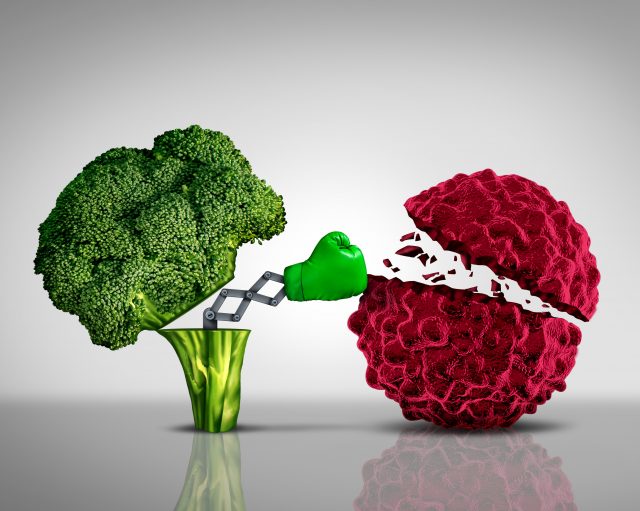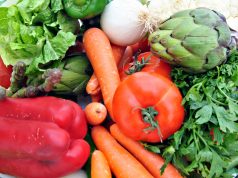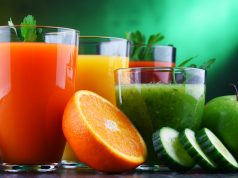Cancer is one of those major health problems that affect millions and millions of people each and every year. More than 1 million people alone are affected with cancer yearly, and as of 2009, a total of 562,000 deaths were projected to occur in the United States alone yearly. What if there were certain kind of foods, and in other words cancer fighting foods that could help your fight against cancer. I am going to inform you of twelve of the most effective Cancer Fighting Foods.
1. Leafy Green Vegetables
Leafy Green Vegetables are one of the most essential components of any healthy diet being that they are exceptionally rich in vitamins, minerals, antioxidants and enzymes, all while being low in calories, fats, sodium and other toxins. Some of these leafy greens are nutritious spinach, kale, collard greens, romaine, arugula salad, watercress, etc. they are rich in antioxidants known to combat cancer, including vitamin C and beta carotene a type of vitamin A. As natural sources of glucosinolates, they also contain antibacterial and antiviral properties, inactivate carcinogens, help reprogram cancer cells to die off, and prevent tumor formation and metastasis. These chemicals are known to break down during the chewing and digestion process into biologically active compounds that prevent cancer cells growth, which are referred to as indoles, thiocyanates and isothiocyanates. To make your nutrient intake as complete as possible try juicing vegetables for near perfect health.
- Cruciferous Vegetables
These vegetables are known to be powerful cancer killers and some of the best vitamin C foods widely available. Many are rich in glutathione, known as the body’s master antioxidant since it has high free radical scavenging abilities. These vegetables are known for being linked to to being a key component in cancer prevention. Cruciferous vegetables like cabbage and broccoli also contain sulforaphanes and indoles which are two types of strong antioxidants and stimulators of detoxifying enzymes that protect the structure of DNA.
- Berries
The ORAC scores of nearly all berries are very high, making them the top high antioxidant foods in the world today. Blueberries, raspberries, cherries, strawberries, goji berries, camu camu and blackberries are easy to find and use in numerous types of recipes and this great news considering that these berries supply vitamin C, vitamin A and gallic acid, a powerful antifungal or antiviral agent that increases immunity.
- Brightly Orange Colored Fruits and Veggies
Brightly colored pigments found in plant foods are a sure sign that they’re beaming with phytochemicals, especially carotenoid antioxidants. This is exactly the reason you want to “eat the rainbow” and vary the colors of the foods on your plate. Carotenoids are derivatives of vitamin A found in many citrus fruits, sweet potatoes, berries, pumpkin, squashes and other plant foods.
One of the most researched is beta-carotene, an essential nutrient for immune functioning; detoxification; liver health; and fighting cancers of the skin, eyes and organs. When it comes to carbohydrate-rich veggies, studies show that complex carbs, including sweet potatoes, carrots, beets, other tubers and whole-grain foods, is related to a reduced risk of several types of cancer, particularly of the upper digestive tract. This is likely due to a favorable role of fiber, but the issue is still open to discussion. In contrast, refined grain intake and high glycemic load foods are not apart of an anti-cancer diet. These have been associated with increased risk of different types of cancer, including breast and colorectal.
- Fresh Herbs and Spices
Tumeric, which contains the active ingredient curcumin, is one of the most powerful ingredients in an anti-cancer diet because it’s been shown to decrease tumor size and fight colon and breast cancer. Along with easy-to-use black pepper, turmeric absorption is enhanced and better able to fight inflammation. Aim for one teaspoon of turmeric powder and 1/4 teaspoon of black pepper or more daily, which can easily be used in a tonic drink, with eggs or in a veggie stir fry. You can also take curcumin supplements; aim for 1,000 milligrams daily.
Additionally, other herbs that act as immune system builders include ginger, raw garlic, thyme, cayenne pepper, oregano, basil and parsley which can easily be used in many recipes, juices, dressings and smoothies.
- Organic Meats
Organic meats including beef or chicken liver are recommended on many cancer-fighting diets since they’re considered some of the most nutrient-dense foods on the planet and extremely high in vitamin B12. Consuming organic meats as part of a “nose to tail” approach to eating animal proteins provides minerals that help cleanse the liver and enhance the ability to remove toxins from the blood and digestive tract. Detoxifying with rich sources of selenium, zinc and B vitamins helps purify blood; produce the bile needed to digest fats; balance hormones naturally; and store essential vitamins, minerals and iron. These mineral-rich foods can help counteract the effects of alcohol, prescription drugs, hormone disruptions, high triglyceride levels, low potassium, obesity and viral infections.
- Cultured Dairy Products
Cultured dairy products are a rich source of “good bacteria” probiotics, which are microorganisms that promote a natural bacterial balance in your intestinal microflora and help increase immunity. Over 80 percent of your immune system is housed in your gut, so it’s no surprise that probiotic foods and supplementation can stop tumor growth and help cells renew.
One of the easiest ways to consume more probiotics is in their most natural state, which includes raw milk products such as cheese, kefir and yogurt. Raw and cultured are key here, since fermentation produces probiotics but high heat processing used to pasteurize dairy can damage many of the vital nutrients, including the enzymes, proteins and probiotics. Most dairy today is loaded with hormones, antibiotics, pain killers and pesticide residue so buying organic is also important. Aim for six ounces of cultured dairy daily.
- Nuts and Seeds
Chia seeds and flaxseeds are two of the most nutrient-dense seeds in the world. They provide fiber, omega-3 fatty acids and a range of important minerals. Hemp seeds, sesame seeds, pumpkin seeds and sunflower seeds are also beneficial and full of healthy fatty acids, as are walnuts, brazil nuts and almonds. Their health benefits and are best sprouted and can be used easily in smoothies, baked goods and with yogurt. Aim for two tablespoons daily.
- Healthy Unrefined Oils
Refined and rancid fats create problems throughout your entire body, leading to lower immune function, cell congestion and inflammation that kicks off disease. Replace refined vegetable oils, hydrogenated oils and trans fats with quality oils, including flax oil, extra virgin olive oil, cod oil and coconut oil. These nourish your gut and promote better immune function, help you reach and maintain a healthy weight, plus flaxseed and cod liver oil contain essential omega-3 fatty acids that can help energize your cells. Olive oil contains phytonutrients that seem to reduce inflammation in the body. It may reduce the risk of breast and colorectal cancers.
- Mushrooms
Nutritious mushrooms vary in terms of their benefits, taste and appearance since hundreds of mushroom species are in existence today, but all are known to be immune-enhancers and many have been used to fight cancer for centuries. Reishi, cordyceps and maitake in particular can improve immune function, fight tumor growth and help with cell regeneration. Look for them in capsule or tincture form, and cook with them whole whenever possible too.
- Traditional Teas
Metastasis is the most deadly aspect of cancer and results from several connected processes including cell proliferation, angiogenesis, cell adhesion, migration and invasion into the surrounding tissue. Metastasis is the principal cause of death among cancer patients, so it’s one of the most important issues in cancer research today. Several clinical and epidemiological studies have reported that the consumption of green tea can help decrease cancer risk. Green tea contains major polyphenolic compounds which has been shown to inhibit tumor invasion and angiogenesis, which are essential for tumor growth and metastasis.
While all traditional teas seem to be beneficial, the most significant effects on human health have been attributed to green tea, such as matcha green tea. It contains the highest percentange of polyphenolic compounds, catechin, gallocatechin and EGCG. The antioxidant EGCG appears to be the most potent of all the catechins, and its anticancer effects have activity about 25–100 times more effective than that of vitamins C and E! EGCG has been reported to be linked to the modulation of multiple signaling pathways, finally resulting in the down regulation of expression of proteins involved in the invasiveness of cancer cells.
- Wild Caught Fish
Higher fish consumption is another favorable diet indicator of better immune function. Wild and especially small fish, including salmon, mackerel and sardines are anti-inflammatory omega-3 foods that are correlated with better brain, hormonal and nervous system health. Omega-3 fatty acids exert anti-inflammatory effects, and therefore recent studies have connected them to cancer prevention and natural enhancement of antitumour therapies. Evidence suggests a role for omega-3 fatty acid supplementation in cancer prevention and reducing symptoms of treatments like chemotherapy. Omega-3s have been shown to preserve muscle mass and function in chemotherapy cancer patients and to contribute to a reduced inflammatory response resulting from the treatment’s toxicity.




























